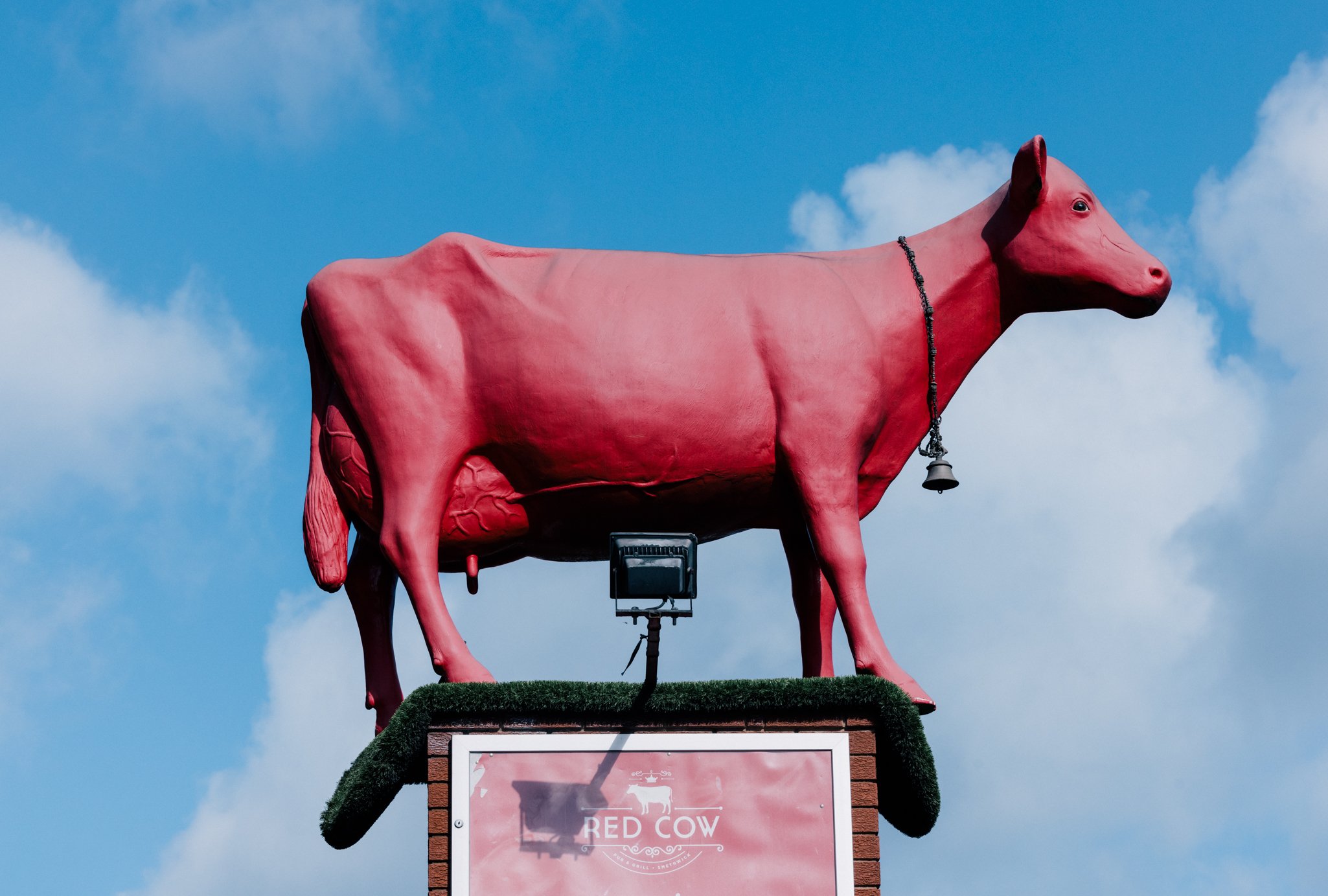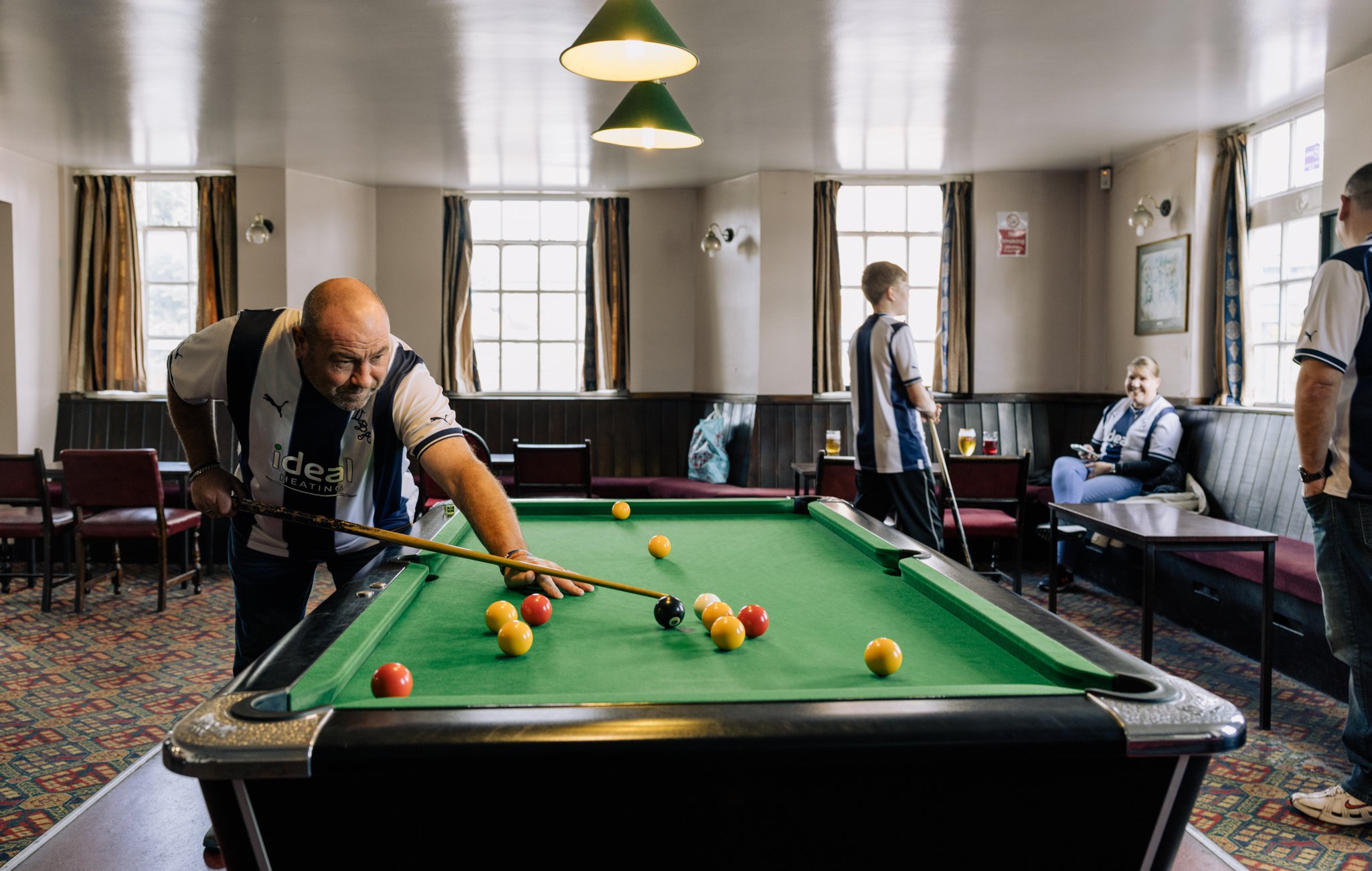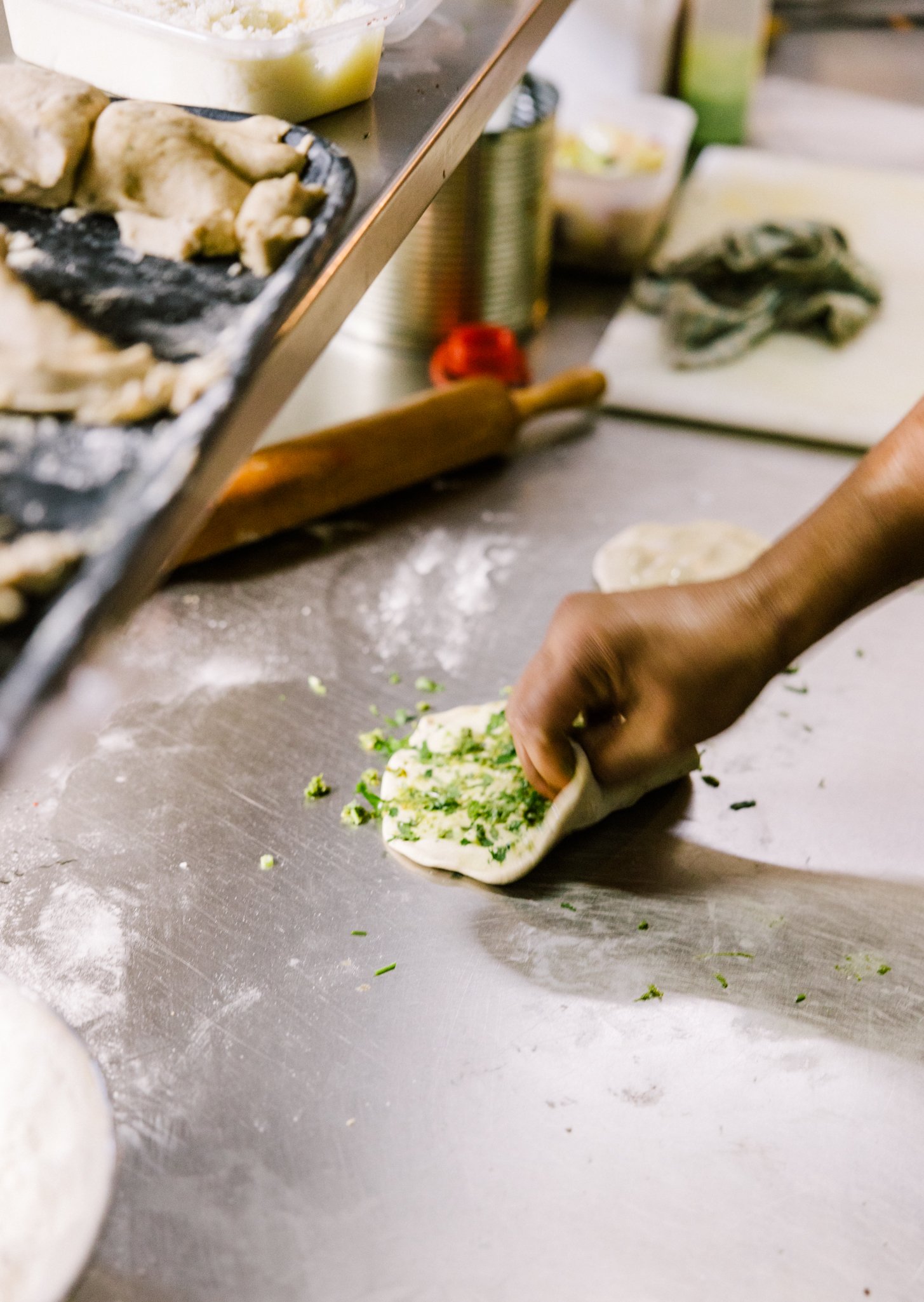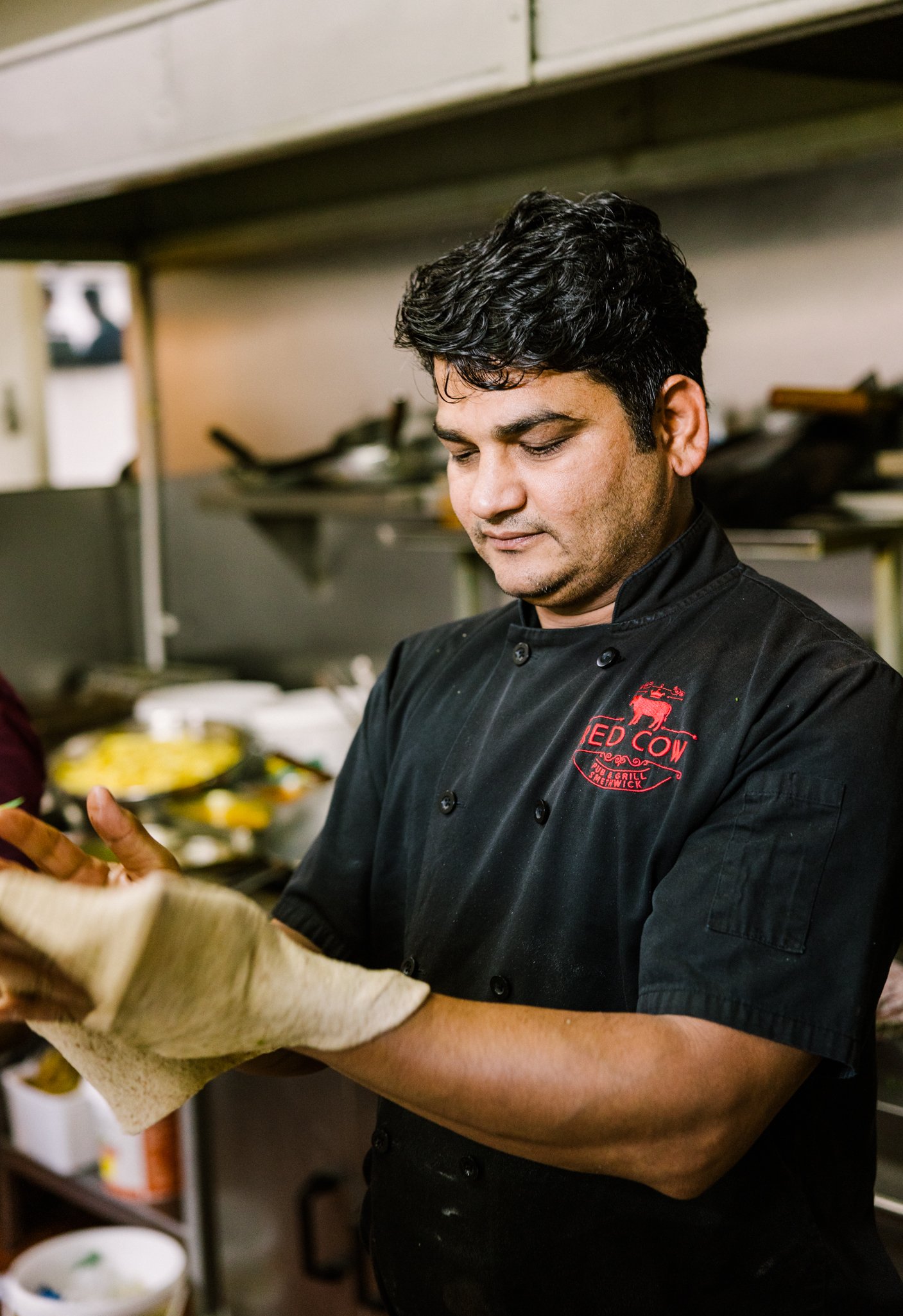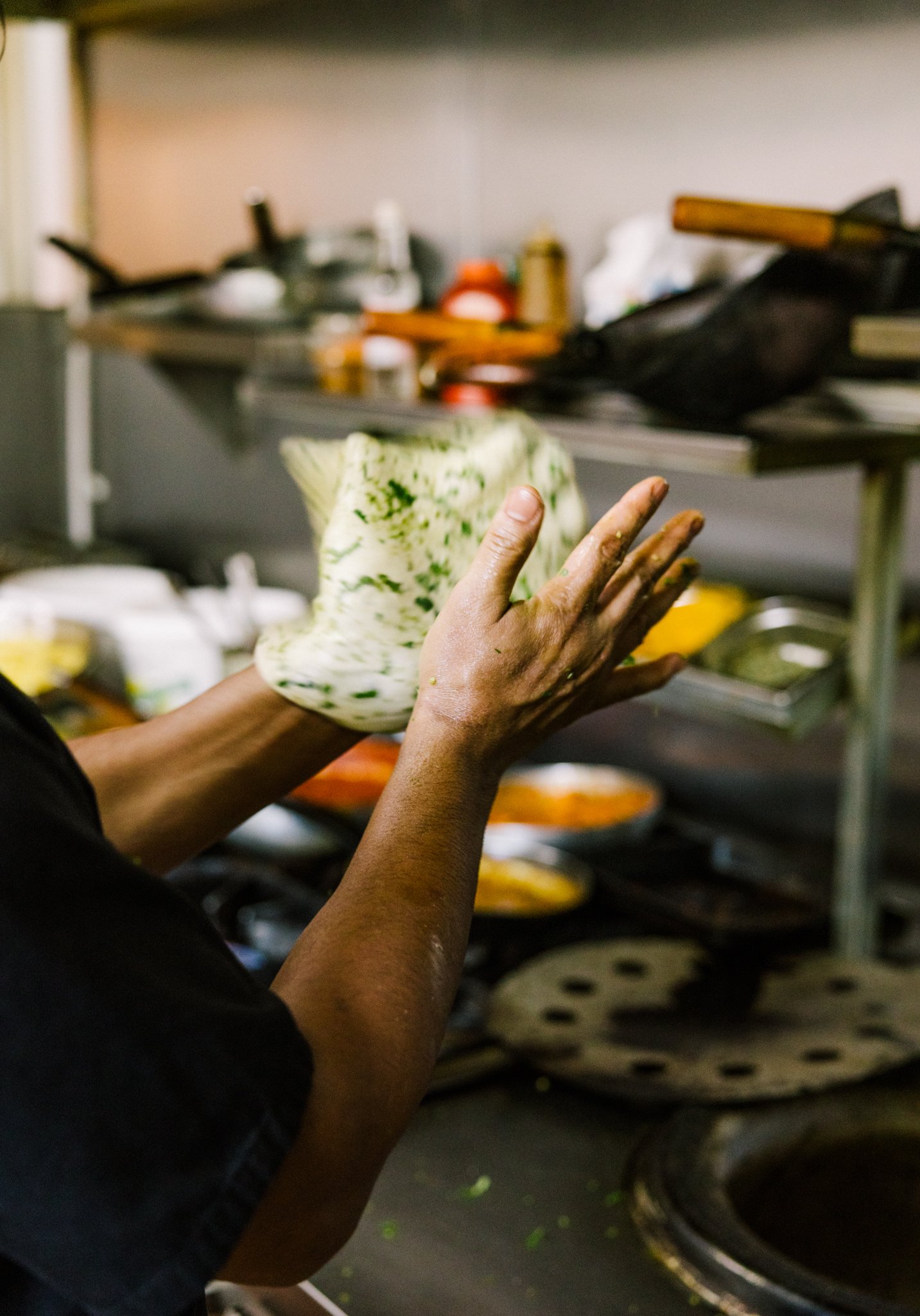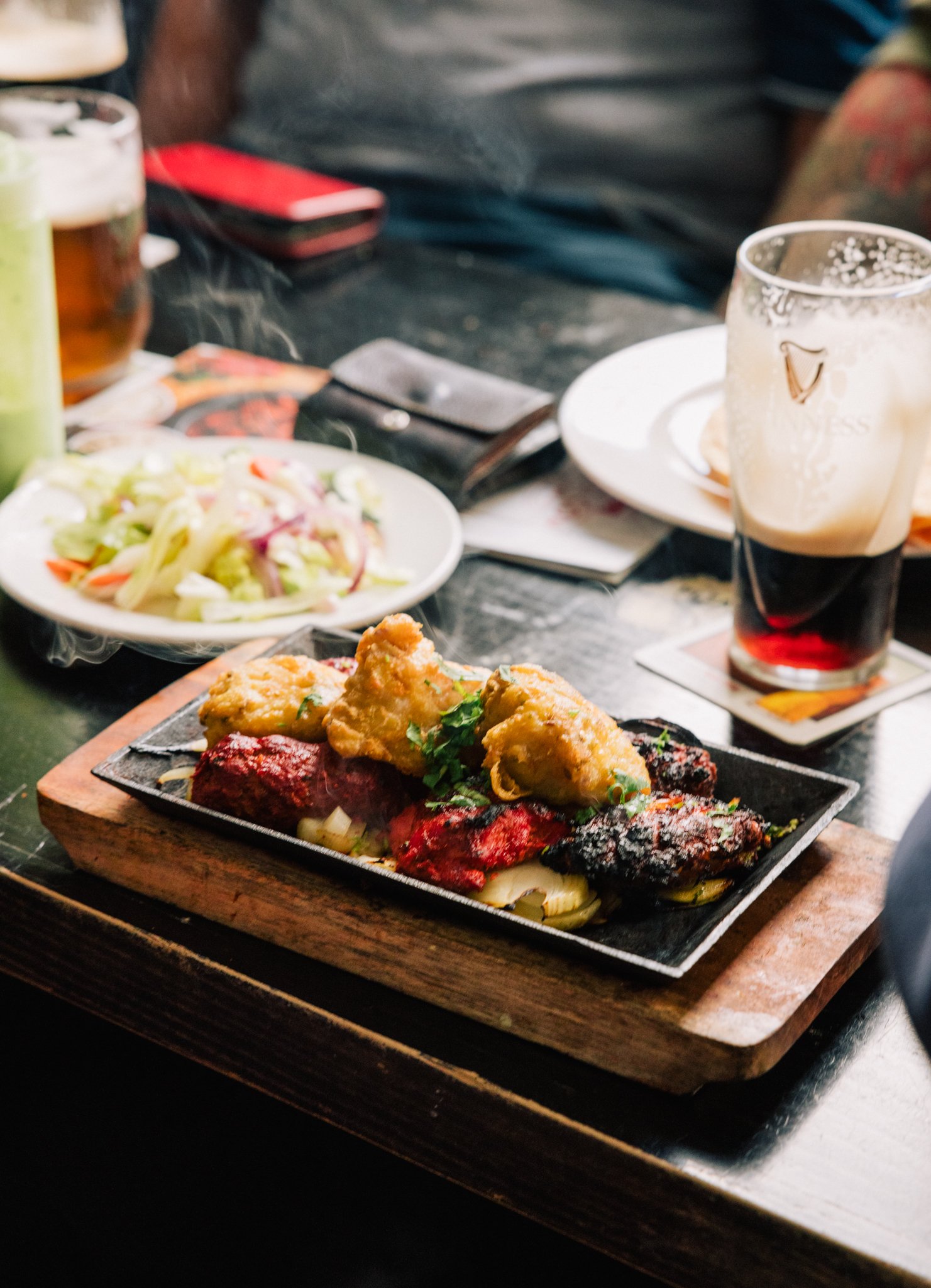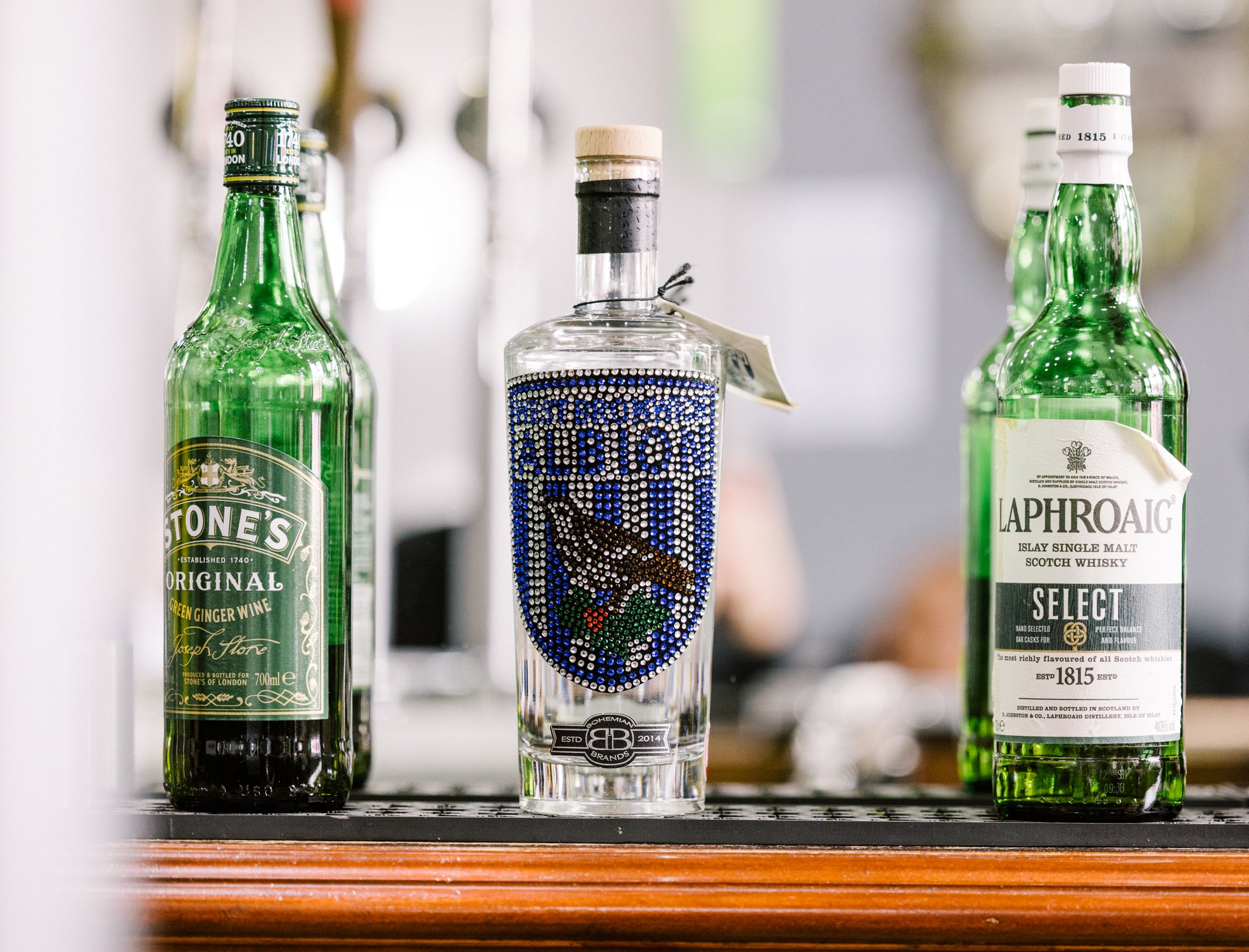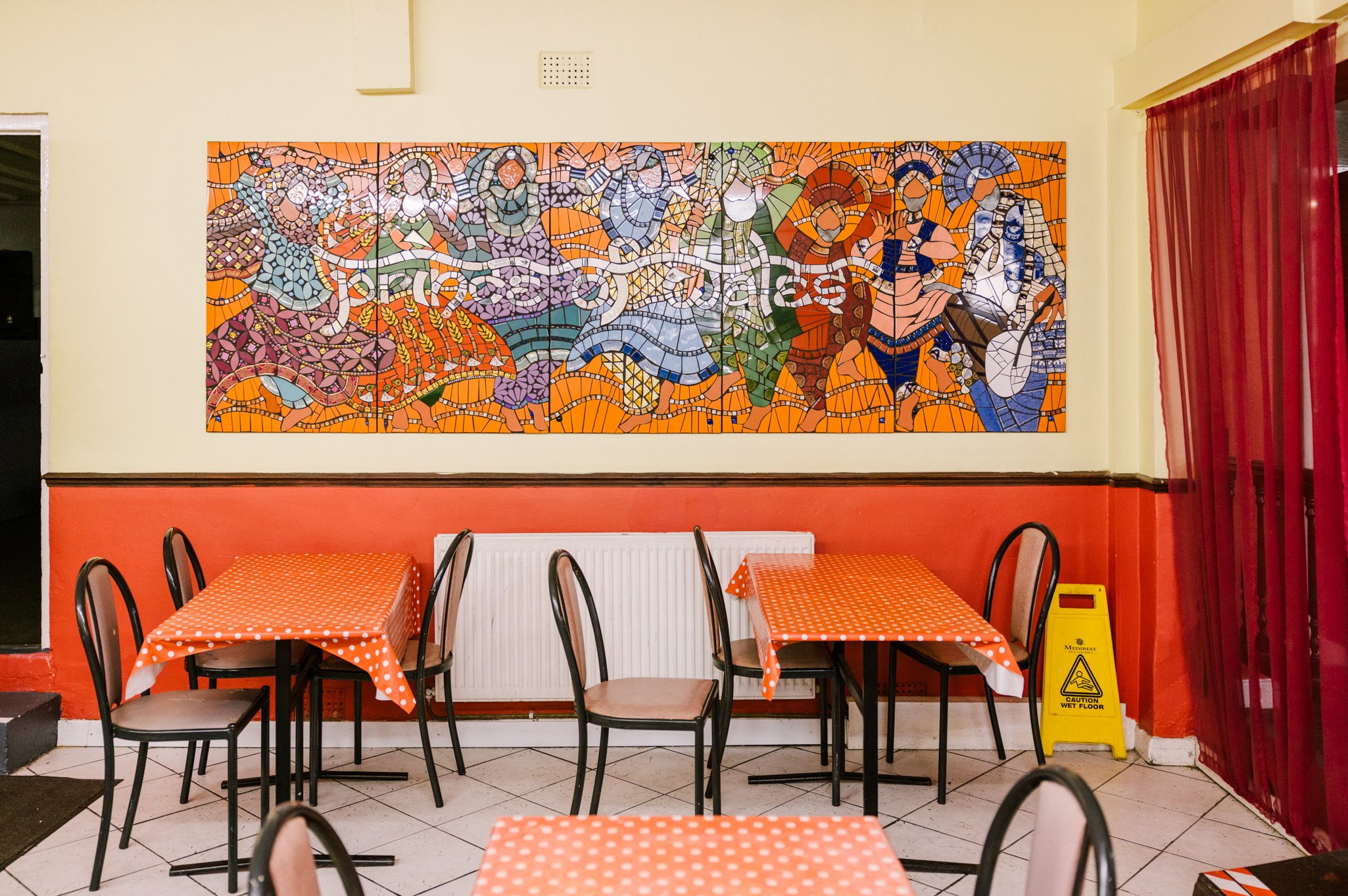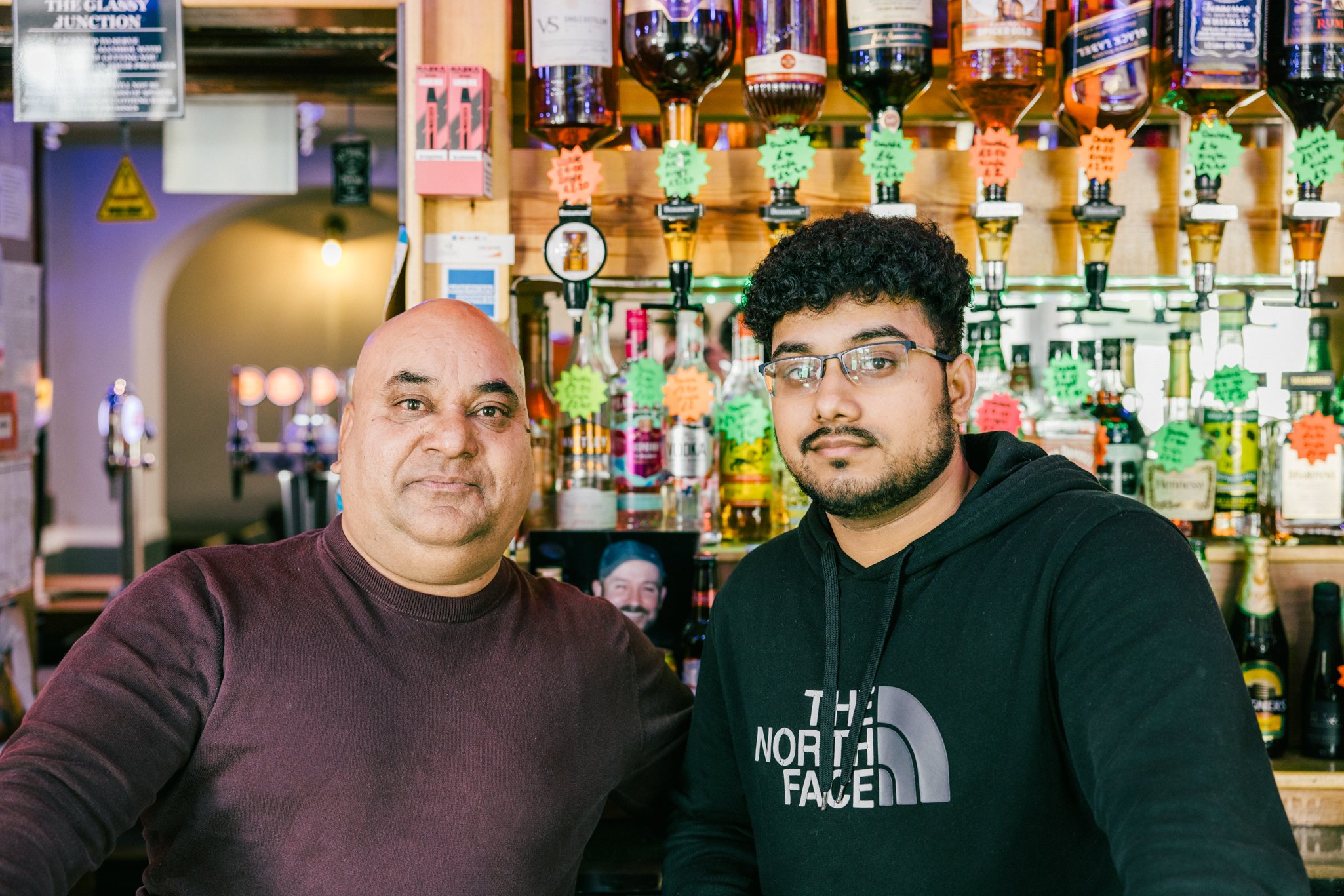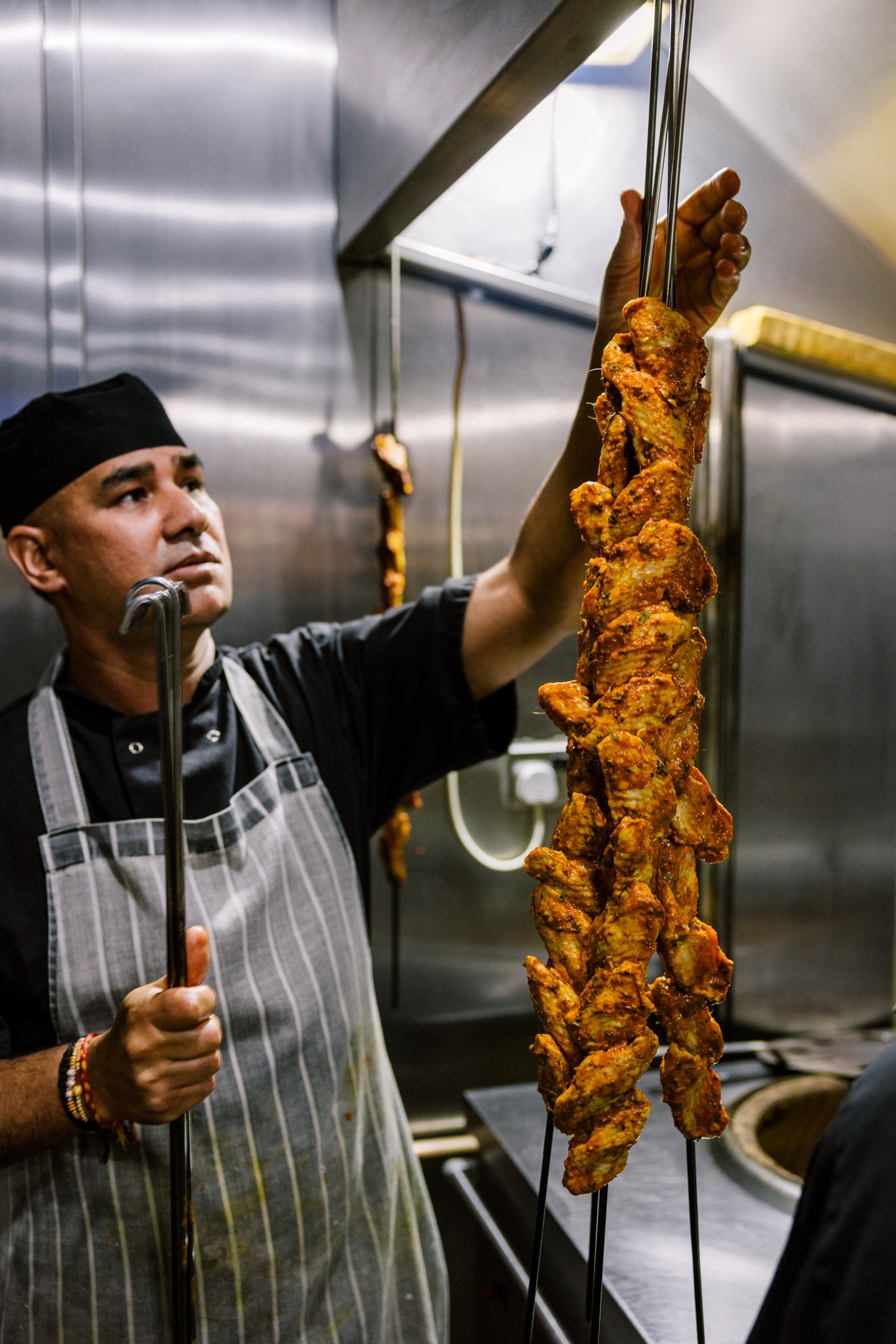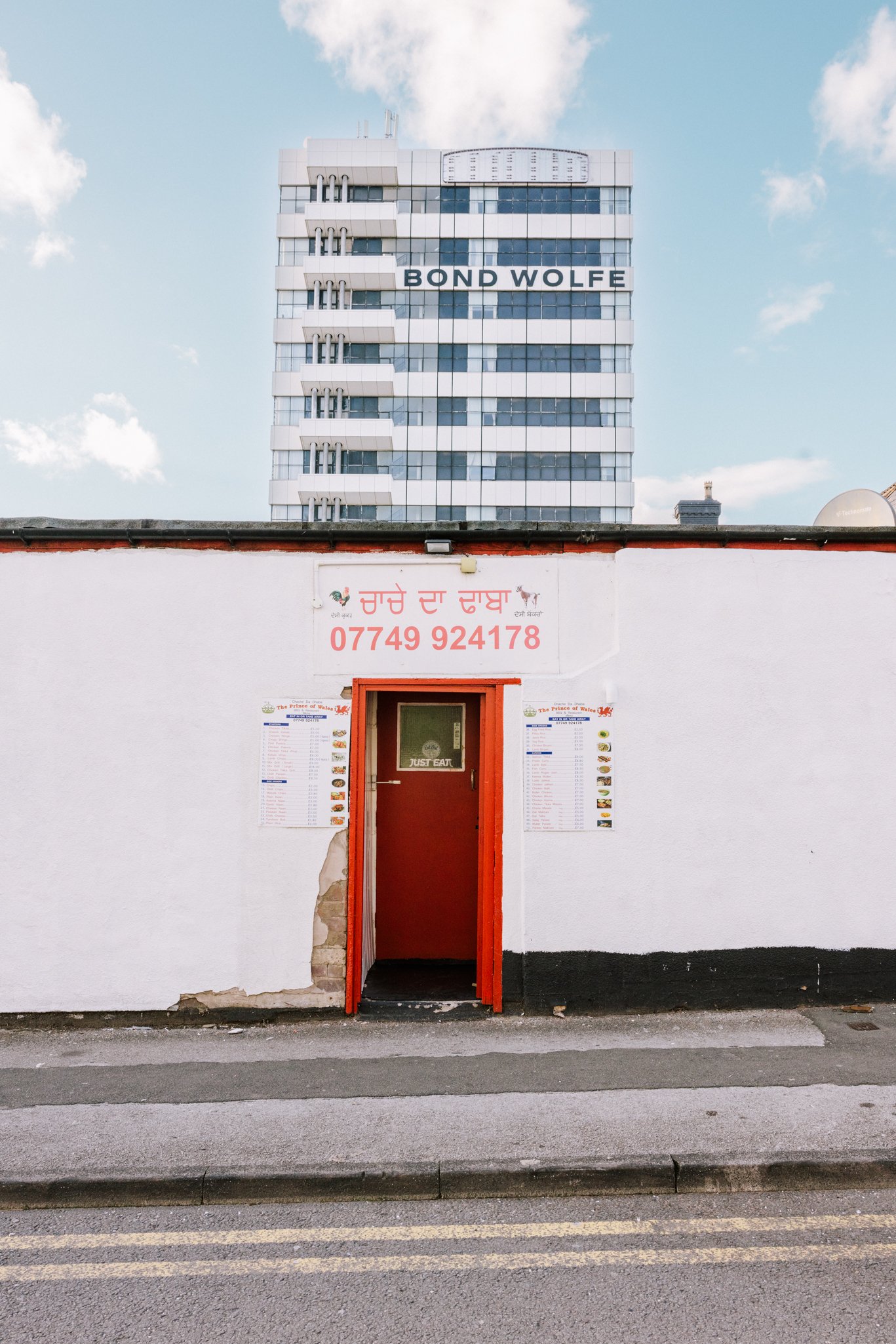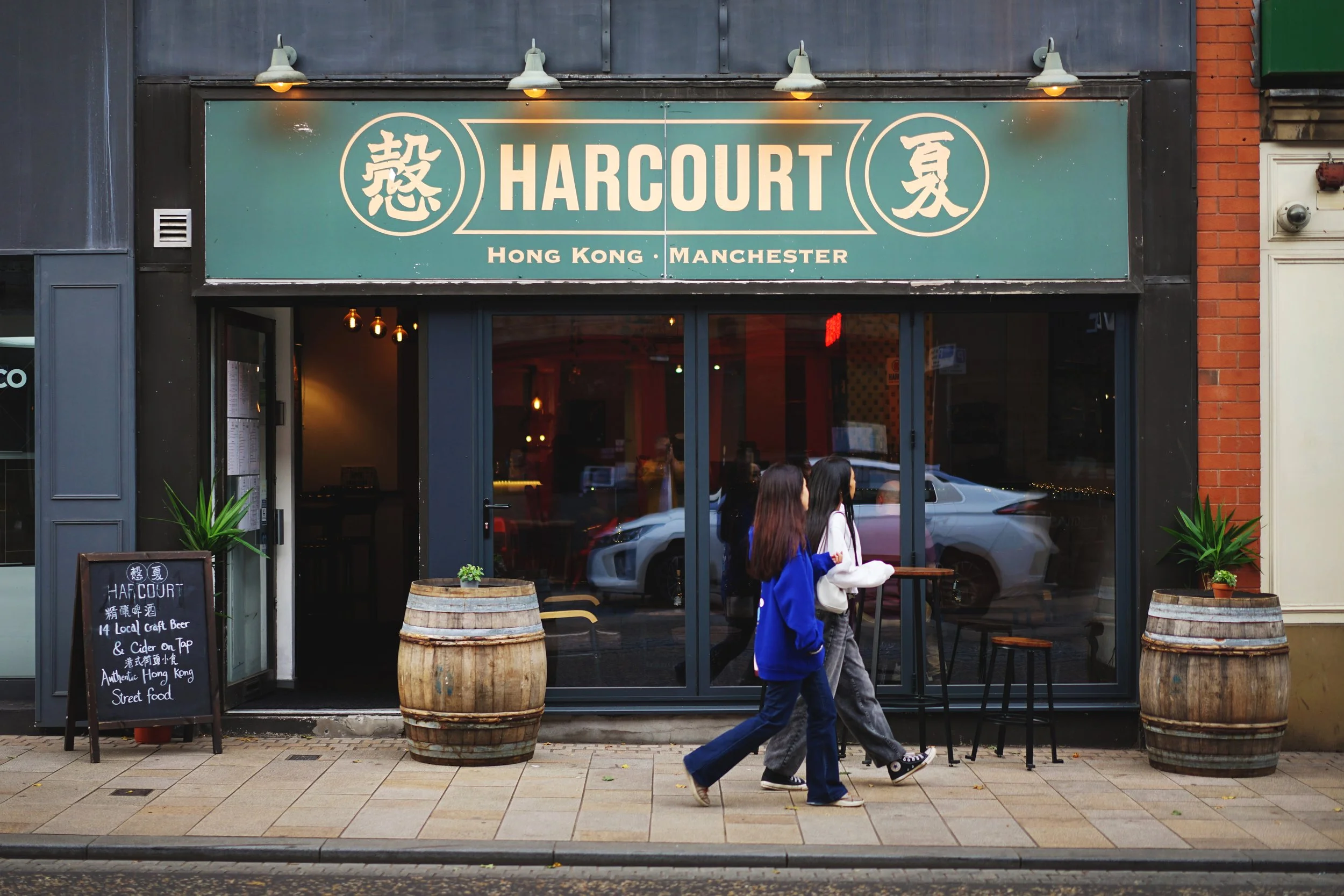Please Don’t Take Me Home — How Black Country Desi Pub Culture Made Football More Diverse
“We’re accepting of people and we don’t stand on ceremony.”
Steve Ghuman is holding court at the bar in the Red Cow in Smethwick. It’s a Saturday afternoon, a couple of hours before his beloved West Bromwich Albion play Swansea City, but he’s not talking solely about the permissiveness of his fellow football supporters. He sincerely believes that the fusion of Black Country football and desi pub culture ensures an inclusive welcome to all.
Photography by Jack Spicer Adams
Smethwick is a post-industrial town, and its recent history is also reflected in Steve’s life. His dad came to Britain from India in the mid to late 1950s to work in one of the infamous Birmid foundries—windowless Victorian buildings where workers toiled in unbearable heat making car parts. White employees did the easy jobs, while Punjabis slogged away, forced into the more dangerous jobs for far less pay.
Steve’s dad navigated a harsh, deeply segregated world that saw pubs divided and Tory MPs espousing racist rubbish. In fact, Enoch Powell would give hateful speeches in this very pub in the days when it was next to the Conservative Club. The racism retreated when these pubs became ‘desi’ and the racist landlords (and MPs) were booted out of the area.
Today a desi pub can be a lot like Steve; a mix of the best British and Indian culture; a place for beers and Indian food, such as sizzling mixed grills and deeply satisfying curries. The food in desi pubs—not just in Smethwick but all around the country—mixes the quality of high-end restaurants like Veeraswamy or Chutney Jane’s in London with the accessibility of a Bangladeshi-run curry house. It’s top grub at pub prices.
But despite the racism of the past, they’re not exclusive British-Asian spaces, and on match days like today, the only clearly demarked lines of colour are the blue and white stripes of the West Brom (affably known as ‘The Baggies’) supporters’ shirts.
“Desi pubs like the Red Cow act as a great symbol that racism is not fixed and that attitudes can change,” says Simon Briercliffe, researcher at the Black Country Living Museum. “I know it's a cliché to praise diversity, but you get such a wide variety of people in a desi pub in a way that very few other places manage. It's a mixture of social classes, genders and ages as well as ethnicities.”
“It's Smethwick in a nutshell,” Simon adds.
Sadly, desi pubs are still unknown in large areas of this country, including much of London. I often have to explain what they are to my friends south of the river, even though I could recommend many excellent establishments in the west or north of the capital, and even centrally, such as the Gladstone, in Borough.
Oddly, desi pubs are usually very British in terms of decor; the Red Cow run by Bera Mahli since 2010 (who also worked in Birmid for a short time before he went into the pub trade) has two traditional lounge bars. They can also be reworked to look like an old-fashioned Indian club-style bar like in the Prince of Wales on West Bromwich high street.
My 15-minute conversation with Steve at the Red Cow was deeply touching—we hugged—as he’s so passionate about making sure non-white fans are safe during the match, and is one of the many Sikhs who have ensured West Brom is home to one of the most diverse football crowds in the country.
The buddy scheme they employ where someone, anyone—not just British-Asians, but families and women, is paired with a seasoned supporter—ensures that about 10-20% of fans present are Sikhs, like Steve, and all different cultures cheer on the team.
“West Brom is a great club,” he tells me. “Because we don’t tolerate racism. It’s a very inclusive club—the players still take the knee and we applaud that.”
““You get such a wide variety of people in a desi pub in a way that very few other places manage.””
Steve also ran a desi pub himself—the Barleycorn in nearby Bearwood. “Desi pubs have opened [our] cuisine up to groups of [white] people,” he says. “A mixed grill here isn’t a mixed grill you’ll find in a Beefeater.”
“I work for a big [company] and when we have people visit from places like Canada I take them here. The food is off-the-scale brilliant and I won’t let them order a chicken tikka masala. I’m glad desi pubs are here and they’d be missed if they weren’t,” he adds.
Inside the Red Cow, Bera, who is 65 years old, is frantically running from three different sets of customers; in the room above the packed pub of football fans, he’s catering for two different parties.
But the football fans are his stock and trade. So much, in fact, he charters fleets of taxis for them before the match. He did this because he used to run Redfort Social Club, which was nearer the ground, and when he moved to the Red Cow he had to come up with a novel way of keeping his Saturday customers.
I leave the pub just as Steve is chauffeured in one of Bera’s taxis to the Baggies stadium, The Hawthorns. Shuttled from one safe space to another.
***
Desi Pubs have changed my identity.
I’m privileged to be given the opportunity to visit the best in the country after being commissioned by CAMRA to write Desi Pubs—a book celebrating their history and culture (to be released in the summer of 2023.) It means that I regularly leave my comfort zone of London and visit places like Smethwick—a town where every pub is a desi pub and has conquered segregation. I claim it’s my Wakanda.
It’s given me a different relationship to this country and to India and to the Indian diaspora who, like me, have to navigate the uncharted position of being a hyphenated community (British-Indian) that can be disconnected from both British and Indian people.
I grew up without any Indian culture because my dad, who was of Indian heritage, chose to portray himself as British; my Malay mother did the same and they repressed their indigenous cultures.
I don’t blame them, as they had no strong brown role models when they came to this country and lived in white-majority spaces. Desi pubs have allowed me to accept this is part of my heritage and own my identity, along with a future which is filled with discovering other British-Indians who also feel a similar disconnect synonymous with being empire children.
Our parents had British educations, and paid British taxes but never were accepted by mainstream white culture or communities—this carries on in our generation. And, worst of all, this British education doesn’t even teach us about our own country. We learn about the industrial revolution and how places like Smethwick fuelled it but we never were taught about the part ‘desis’ played in it. (Desi, meaning “local” or “native”, can be used like slang to refer to anyone brown).
However, when I walk into a pub run by an Asian landlord anywhere from Southall to Smethwick I feel at ease. Not just because this a brown space but because I now feel part of a movement; a movement which started as a reaction to the racist colour bar but then blossomed into a celebration of British-Indian cuisine and culture.
I now love mixed grills, giant naans as well as bhangra and Indian spirits (I urge you to seek out Old Monk, a vanilla-y smooth rum.) I even know a few important Punjabi words, which is radical for me because I’ve always felt insecure around multi-lingual South Indians.
It all started here when I wrote this piece for Pellicle in June 2021, detailing their unique place in Britain and setting the template for my beer writing career.
Because of this piece I had, perhaps unwittingly, discovered a universal truth—we don’t know anything about our own history when it touches uncomfortable ‘unseen’ subjects that are right in front of us.
There’s a lot that’s missing from this first story I didn’t dwell too much on how the term ‘desi’ has many meanings: I mentioned it referred to ‘back home’ but hadn’t realised it was given to one of my favourite dishes—desi-style chicken curry, which is a broth-like curry where chicken on the bone is slow cooked like in a Dhaba (an Indian roadside food stall).
Kanthi Thamma, an Indian chef based in Brighton, summed up desi for me: - “desi is a feeling,” he said. He’s right. It’s a romantic notion and one which is slowly fading. Desi culture is about recreating what it was like ‘back home’ in India but now Indians in India scoff at our craving to preserve the past. While we’re trying to remember a rural-based India where all cultures existed harmoniously before partition, they’re looking to the West.
Take Old Monk: it’s truly a desi drink in that you can only really find it in airports’ duty-free bargain bins because the target market is people like me. While I’m sipping a drink favoured by Indian sepoys (soldiers) and policemen, people in India (one of the world’s largest whisky markets) are drinking bourbon or single malt.
Therefore, the term ‘desi’ would die out if it wasn’t for the success of desi pubs, restaurants and cafes—the term is forever linked with a warm welcome.
***
Like the Red Cow, the Blue Gates in Smethwick has a shameful history but one that’s often retold. It was the pub Malcolm X visited when he met anti-racist campaigner Avtar Jouhl Singh in 1965 when he wanted to see how bad segregation was in this country. When he was refused service he said: ‘‘This is worse than America. This is worse than Harlem.”
Recently I’ve become firm friends with his son, Jagwant, and during the weekend I’m visiting Smethwick I’m pained to hear a rumour that Avtar might be ill. (I’m sad to report that he died just a few days later.) It casts a shadow on my trip not least because he’s loved by all the landlords I meet. Avtar is the founding father of modern Smethwick because his protests against segregation led to a nationwide outcry and the first Black Country desi pubs being established.
““Desis would come here and say this ‘is a pub like back home in India.’””
But for now, at the Blue Gates, landlord Jatinder (Jat) only wants us to have a good time, which includes teasing me for being like Louis Theroux infiltrating a culture that could seem alien to many. The pub that was once a hateful, divided area fills with Albion supporters, including Craig Perry, who has brought his four children (and one of their friends).
Craig is wearing a retro shirt celebrating black footballer Cyrille Regis—earlier Steve said that pioneering black players of the late 70s and early 80s drew desis to the ground—and has been coming to this pub before the game since he was a teenager. He’s now 38 and tells me “This is the Albion pub,” the one that’s become most linked with beers before the game, demonstrating how fans view desi pubs as the traditional link to their team.
I even discover that it does have “security”, a man called Luke who quietly ushers away fans to other pubs, but he’s rarely deployed. Instead, he’s sat at the bar, happy to chat about how he prefers to be described as a Brit with Jamaican heritage rather than ‘Black’ as he finds it too divisive.
During this I notice how intertwined this pub is with its weekly community of football fans; it’s not a transient population like in other pre-match boozers I’ve been to and Jat knows all his punters and asks them how their week’s been. In fact, the Blue Gates is as much punctuation of their weeks as watching their team draw, or lose…
Jat is one of the many desi landlords who remembers me from my frequent visits, and I recommend the Blue Gates now not because of its troubled history but because of its M&B Mild which will set you back slightly over £2.
“A lot of people tell me it’s the cheapest pint outside of Wetherspoons,” he tells me.
It’s a pint favoured by the older desis because when they were working in the foundries it was what they drank on their lunch breaks; the bar staff would pour the pints ready for their arrival. It might be contract brewed by Molson Coors these days but it’s a huge part of my British-Asian heritage and a lovely-looking (and tasting) pint.
The white cream flow top is now synonymous to me—one taste and I’m back to where I now feel like I belong.
***
The Prince of Wales in West Brom is where my desi pub mini-run should’ve ended, and was my last stop before the game. But it’s here that I became bewitched by landlord Jinder Birring.
“This is a proper desi pub,” he says. “It’s Punjabi style. Desis would come here and say this ‘is a pub like back home in India’.”
Jinder is keen to entertain, showing me his Punjabi instruments (he plays the single-string tumbi, famous in the West thanks to songs like Missy Elliott’s Get Ur Freak On) and is very proud of the Indian singers and dancers he books on Friday and Saturday nights.
Without it, West Bromwich high street would really be struggling, especially as a lot of shops have been closed recently. This is another side to desi pubs in how they help regenerate areas and bolster surrounding businesses.
Baggies fan Elaine Maher, who is about to head to the ground, tells me she’s so proud of them. “They bring money into the local economy,” she says. “Not just on match days. It’s the food: we all love eating in them.”
After the quick conversation with Elaine, Jinder takes me to another pub he helped his friend set up called Glassy Junction in Willenhall (Glassy means a shot glass in India). The journey is just as exciting as the destination as we go in his Land Rover which many British-Indians stop to take photographs of. He points out of the window showing me other pubs he once owned including the remarkable Billiard Hall, which is now a Wetherspoons.
We’ve come for a mixed grill and in desi pubs it’s a sensory overload: marinated meat cooked first on the tandoor and then “grilled” on a bed of onions, which has to be scooped up at the end with naan.
It’s on this trip that I realised that all the desi pubs I’ve visited today are ever evolving and changing their identity. This Glassy Junction, named after a legendary desi pub in Southall, West London, that accepted rupees, is not a pub that you used to find in India, like Jinder’s It’s a large country-style pub serving excellent food.
At this point I was supposed to go to the match itself (which the Baggies lost) but the allure of a new desi pub was too much.
Sharing a mixed grill with Birring reminds me of Steve claiming this one dish opens up desi culture to others but my thoughts are interrupted when I hear the Prince of Wales landlord shout: “Attack the stack!” and we savour the very best the Punjab, and indeed the Black Country has to offer.



